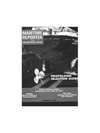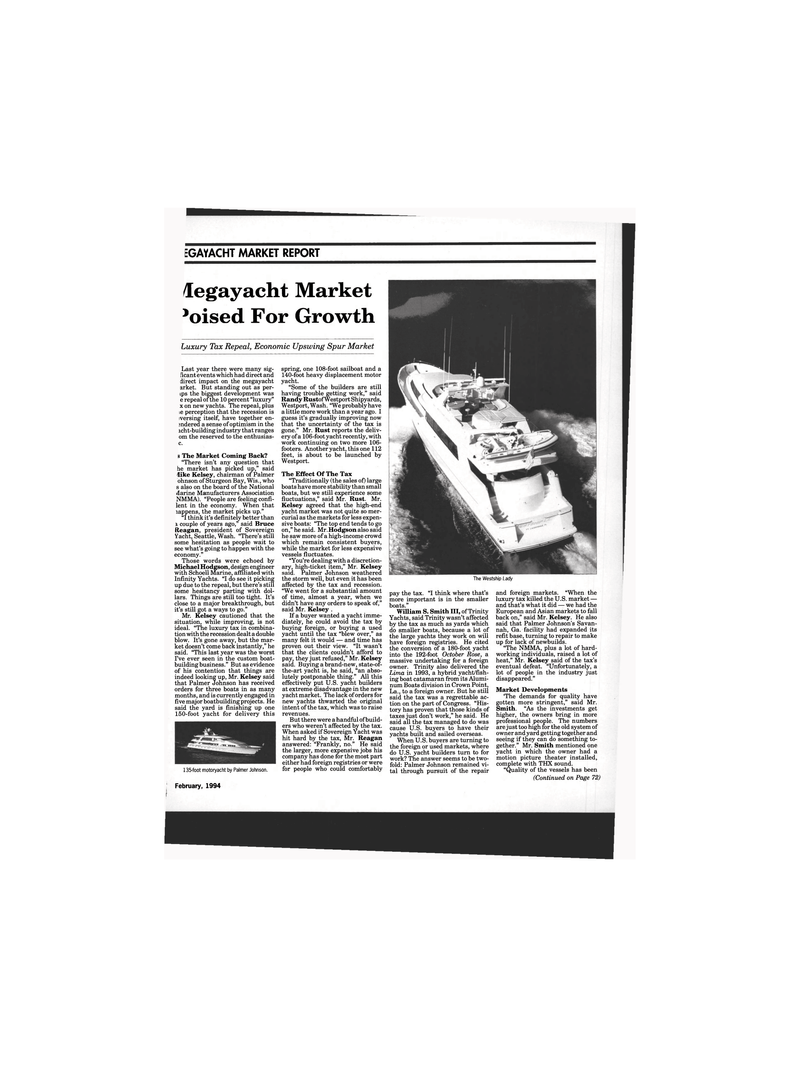
Page 61: of Maritime Reporter Magazine (February 1994)
Read this page in Pdf, Flash or Html5 edition of February 1994 Maritime Reporter Magazine
EGAYACHT MARKET REPORT legayacht Market >oised For Growth
Luxury Tax Repeal, Economic Upswing Spur Market
The Westship Lady
Last year there were many sig- ficant events which had direct and direct impact on the megayacht arket. But standing out as per- ips the biggest development was e repeal of the 10 percent "luxury" x on new yachts. The repeal, plus
Le perception that the recession is versing itself, have together en- jndered a sense of optimism in the icht-building industry that ranges om the reserved to the enthusias- c. s The Market Coming Back? "There isn't any question that he market has picked up," said like Kelsey, chairman of Palmer ohnson of Sturgeon Bay, Wis., who s also on the board of the National
Marine Manufacturers Association
NMMA). "People are feeling confi- lent in the economy. When that lappens, the market picks up." "I think it's definitely better than i couple of years ago," said Bruce
Reagan, president of Sovereign
Yacht, Seattle, Wash. "There's still some hesitation as people wait to see what's going to happen with the economy."
Those words were echoed by
Michael Hodgson, design engineer with Schoell Marine, affiliated with
Infinity Yachts. "I do see it picking up due to the repeal, but there's still some hesitancy parting with dol- lars. Things are still too tight. It's close to a major breakthrough, but it's still got a ways to go."
Mr. Kelsey cautioned that the situation, while improving, is not ideal. "The luxury tax in combina- tion with the recession dealt a double blow. It's gone away, but the mar- ket doesn't come back instantly," he said. "This last year was the worst
I've ever seen in the custom boat- building business." But as evidence of his contention that things are indeed looking up, Mr. Kelsey said that Palmer Johnson has received orders for three boats in as many months, and is currently engaged in five major boatbuilding projects. He said the yard is finishing up one 150-foot yacht for delivery this 135-foot motoryacht by Palmer Johnson.
February, 1994 113 spring, one 108-foot sailboat and a 140-foot heavy displacement motor yacht. "Some of the builders are still having trouble getting work," said
Randy RustofWestport Shipyards,
Westport, Wash. "We probably have a little more work than a year ago. I guess it's gradually improving now that the uncertainty of the tax is gone." Mr. Rust reports the deliv- ery of a 106-foot yacht recently, with work continuing on two more 106- footers. Another yacht, this one 112 feet, is about to be launched by
Westport.
The Effect Of The Tax "Traditionally (the sales of) large boats have more stability than small boats, but we still experience some fluctuations," said Mr. Rust. Mr.
Kelsey agreed that the high-end yacht market was not quite so mer- curial as the markets for less expen- sive boats: "The top end tends to go on," he said. Mr. Hodgson also said he saw more of a high-income crowd which remain consistent buyers, while the market for less expensive vessels fluctuates. "You're dealing with a discretion- ary, high-ticket item," Mr. Kelsey said. Palmer Johnson weathered the storm well, but even it has been affected by the tax and recession. "We went for a substantial amount of time, almost a year, when we didn't have any orders to speak of," said Mr. Kelsey .
If a buyer wanted a yacht imme- diately, he could avoid the tax by buying foreign, or buying a used yacht until the tax "blew over," as many felt it would — and time has proven out their view. "It wasn't that the clients couldn't afford to pay, they just refused," Mr. Kelsey said. Buying a brand-new, state-of- the-art yacht is, he said, "an abso- lutely postponable thing." All this effectively put U.S. yacht builders at extreme disadvantage in the new yacht market. The lack of orders for new yachts thwarted the original intent of the tax, which was to raise revenues.
But there were a handful of build- ers who weren't affected by the tax.
When asked if Sovereign Yacht was hit hard by the tax, Mr. Reagan answered: "Frankly, no." He said the larger, more expensive jobs his company has done for the most part either had foreign registries or were for people who could comfortably pay the tax. "I think where that's more important is in the smaller boats."
William S. Smith III, of Trinity
Yachts, said Trinity wasn't affected by the tax as much as yards which do smaller boats, because a lot of the large yachts they work on will have foreign registries. He cited the conversion of a 180-foot yacht into the 192-foot October Rose, a massive undertaking for a foreign owner. Trinity also delivered the
Lima in 1993, a hybrid yacht/fish- ing boat catamaran from its Alumi- num Boats division in Crown Point,
La., to a foreign owner. But he still said the tax was a regrettable ac- tion on the part of Congress. "His- tory has proven that those kinds of taxes just don't work," he said. He said all the tax managed to do was cause U.S. buyers to have their yachts built and sailed overseas.
When U.S. buyers are turning to the foreign or used markets, where do U.S. yacht builders turn to for work? The answer seems to be two- fold: Palmer Johnson remained vi- tal through pursuit of the repair and foreign markets. "When the luxury tax killed the U.S. market — and that's what it did — we had the
European and Asian markets to fall back on," said Mr. Kelsey. He also said that Palmer Johnson's Savan- nah, Ga. facility had expanded its refit base, turning to repair to make up for lack of newbuilds. "The NMMA, plus a lot of hard- working individuals, raised a lot of heat," Mr. Kelsey said of the tax's eventual defeat. "Unfortunately, a lot of people in the industry just disappeared."
Market Developments 'The demands for quality have gotten more stringent," said Mr.
Smith. "As the investments get higher, the owners bring in more professional people. The numbers are just too high for the old system of owner and yard getting together and seeing if they can do something to- gether." Mr. Smith mentioned one yacht in which the owner had a motion picture theater installed, complete with THX sound. "Quality of the vessels has been (Continued on Page 72)

 60
60

 62
62
